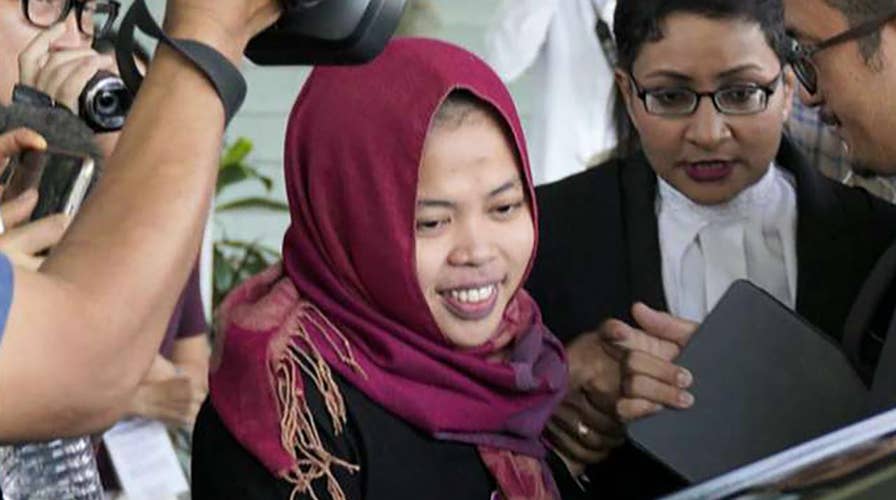Siti Aisyah, the Indonesian woman who was freed from custody in Malaysia Monday after being charged with killing the half-brother of North Korean leader in 2017, said she was skeptical when she first heard she was being released.
"[I was] shocked at first, I couldn't believe it," she said of her release. "But I'm happy."
Aisyah and another woman, Vietnamese Doan Thi Huong, were accused of smearing VX nerve agent on Kim Jong Nam’s face at Kuala Lumpur airport and spent the last two years in jail.
She said she and Huong were recruited to take part in what they thought were to be pranks at the airport for television.
"I never [thought] that I was being entangled to such an extent," Aisyah told BBC Indonesian.
US SEEKS ACCESS TO INSPECT REBUILT NORTH KOREAN MISSILE LAUNCH-SITE
After the charges and jail, she said, she wondered: “Is this the end of my life?"

Indonesian Siti Aisyah, left, hugs her mother Benah, right, after a press conference at foreign minister office in Jakarta, Indonesia, Monday, March 11, 2019. The Indonesian woman held two years on suspicion of killing North Korean leader's half brother Kim Jong Nam was freed from custody Monday after prosecutors unexpectedly dropped the murder charge against her. (AP)
Aisyah, who worked in Malaysia since 2015, did not elaborate in the interview how she was recruited, or by whom, the BBC said.
She said she hopes Huong also is freed. She was anxious to leave Malaysia and does not want to return, the BBC reported.
The unexpected turn of events occurred after prosecutors dropped the murder charge against her. They did not give a reason for the sudden move.
At a press conference on Monday, Aisyah said she was treated well in prison.
NORTH KOREAN SHAM ELECTION HAD 99.99 PERCENT TURNOUT, STATE MEDIA SAYS
Prosecutor Iskandar Ahmad said Aisyah's discharge without an acquittal means she can be charged again if there is fresh evidence, but there are no such plans now.
Indonesia's government said its continued high-level lobbying resulted in Aisyah's release. The country's foreign ministry said in a statement that Aisyah was "deceived and did not realize at all that she was being manipulated by North Korean intelligence."
It said Aisyah, a migrant worker, never had any intention of killing Kim.
Defense lawyers argued that Huong and Aisyah were scapegoats in the death of Kim Jong Nam at Kuala Lumpur’s airport. Prosecutors said four North Korean suspects recruited the women and provided them with the banned VX nerve agent used to kill Kim before fleeing the country on the same day.
The Indonesian ministry said that during the past two years, Aisyah's plight was raised in "every bilateral Indonesia-Malaysia meeting," including at the presidential level, the vice presidential level and in regular meetings of the foreign minister and other ministers with their Malaysian counterparts.

Indonesian Siti Aisyah is escorted by police as she arrives for a court hearing at Shah Alam High Court in Shah Alam, Malaysia, Wednesday, Nov. 7, 2018. The two woman arrived at court for case management after Malaysian court ordered them to enter their defense over the murder of north Korean leader's half brother in an assassination that has gripped the world. (AP)
In contrast to Indonesia's strong push, Vietnam has not lobbied as aggressively for Huong's release, and recently hosted Kim Jong Un for an official visit and a summit with President Donald Trump.
Huong's trial is to resume Thursday when prosecutors are expected to reply to a request by her lawyers for the government to also withdraw the charges against her.
Huong's lawyer, Hisyam Teh Poh Teik, said Huong felt Aisyah's discharge was unfair to her because the judge last year had found sufficient evidence to continue the murder trial against them.
"She is entitled to the same kind of consideration as Aisyah," he said. "We are making representation to the attorney general for Doan to be taken equally...there must be justice."
CLICK HERE TO GET THE FOX NEWS APP
Malaysian officials have never officially accused North Korea and have made it clear they don't want the trial politicized.
Kim was the eldest son in the current generation of North Korea's ruling family. He had been living abroad for years but could have been seen as a threat to Kim Jong Un's rule.
The Associated Press contributed to this report.

